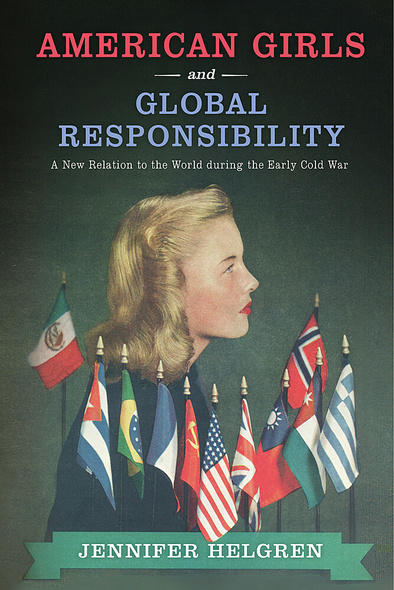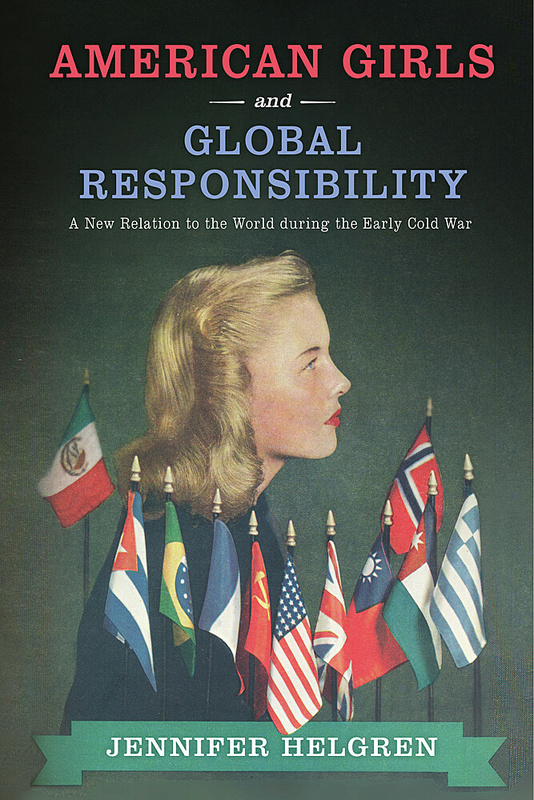American Girls and Global Responsibility
A New Relation to the World during the Early Cold War
Rutgers University Press
American Girls and Global Responsibility brings together insights from Cold War culture studies, girls’ studies, and the history of gender and militarization to shed new light on how age and gender work together to form categories of citizenship.
Jennifer Helgren argues that a new internationalist girl citizenship took root in the country in the years following World War II in youth organizations such as Camp Fire Girls, Girl Scouts, YWCA Y-Teens, schools, and even magazines like Seventeen. She shows the particular ways that girls’ identities and roles were configured, and reveals the links between internationalist youth culture, mainstream U.S. educational goals, and the U.S. government in creating and marketing that internationalist girl, thus shaping the girls’ sense of responsibilities as citizens.
Jennifer Helgren argues that a new internationalist girl citizenship took root in the country in the years following World War II in youth organizations such as Camp Fire Girls, Girl Scouts, YWCA Y-Teens, schools, and even magazines like Seventeen. She shows the particular ways that girls’ identities and roles were configured, and reveals the links between internationalist youth culture, mainstream U.S. educational goals, and the U.S. government in creating and marketing that internationalist girl, thus shaping the girls’ sense of responsibilities as citizens.
Helgren addresses a missing chapter in the history of American girlhood: their roles as productive citizens in the postwar United States. This is a welcome and well-researched study that shows how girls worked to build a peaceful, outward looking, and internationalist citizenship befitting a nation seeking to reestablish ties with its former enemies.'
Drawing on extensive historical evidence created by girls, Helgren cogently demonstrates that despite being stereotyped as 'frivolous,' pre-adolescent and teenage girls contributed to post-World War II efforts to create friendly, peaceful international relationships while also promoting U.S. global leadership in the early Cold War. This book is a valuable contribution to histories of childhood and youth, gender, U.S. foreign relations, and peace activism.'
Helgren's study provides a fresh examination of cultural diplomacy in the early Cold War years by demonstrating how American girls and their organizations advanced U.S. foreign policy. [The book] skillfully connects an impressive level of primary research to the scholarship on childhood, gender, and international relations.
In this exceptional study of mid-twentieth-century youth culture, Helgren provides an insightful and engaging perspective of postwar girlhood and the literature that influenced it.
Helgren’s study adds a new and important perspective to conversations on citizenship, internationalism, and gender in the early Cold War era.
In a world where people are divided and marginalized, Helgren’s work offers valuable lessons about the important roles that girl citizens can teach Americans today about global cooperation and mutual understanding.
American Girls and Global Responsibility is part of a growing body of literature that explores how the constructions of childhood and the actions of young people intersect with histories of war, peace work, and international relations. Much like the youth who collected scrap metal and weeded family victory gardens did their bit during the world wars, a shared spirit of youth was inspired (and required) to do their part, this time in the battle for winning hearts and minds.
JENNIFER HELGREN is an associate professor in the department of history at University of the Pacific in Stockton, California. She is also coeditor of Girlhood: A Global History (Rutgers University Press).
Acknowledgments
Introduction
1. “What Kind of World Do You Want?”: Preparing Girls for Peace and Tolerance in the Atomic Age
2. “Hello, World, Let’s Get Together”: Building Global Conversations through Pen Pals and Care Packages
3. “Famous for Its Cherry Blossoms”: Reimagining Japan and Germany in the Postwar Period
4. “Playing Foreign Shopper”: Consuming Internationalism
5. “We Hand the Communists Powerful Propaganda Weapons to Use against Us”: Defending Global Citizenship during the Post–World War II Red Scare
Epilogue: The Watchers of the Skies
Notes
Index








